The future of music copyright
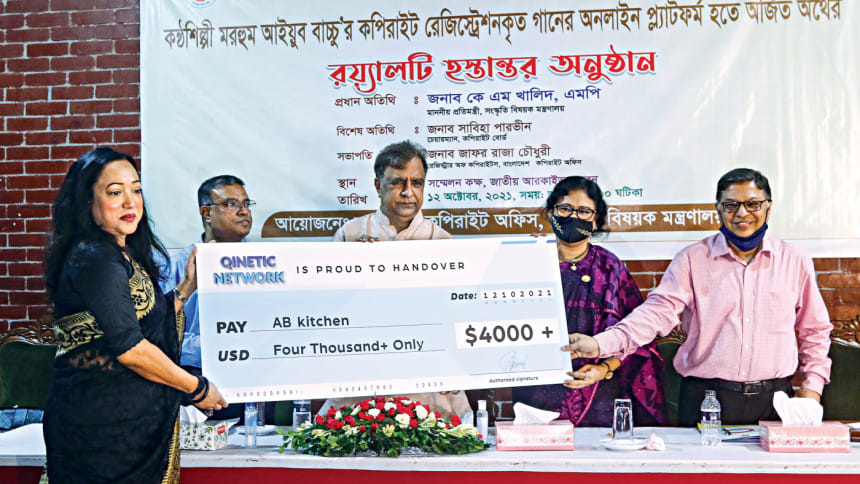
In recent times, Baul Shah Abdul Karim's family received royalties from the Copyright Office after his songs were digitally archived. Similarly, Ayub Bachchu's family also received royalties for his songs when they were brought under the digital protection act.
Many artistes, singers, lyricists, and composers have benefited from the digital archiving of their work. As a musician it's their right to protect their intellectual property and ensure that they don't face any form of exploitation. Thus, the progress in the field of copyrighting music has been beneficial for many. Now, like Baul Shah Abdul Karim and Ayub Bachchu's families, other artistes are also receiving royalty payments from the Copyright Office.
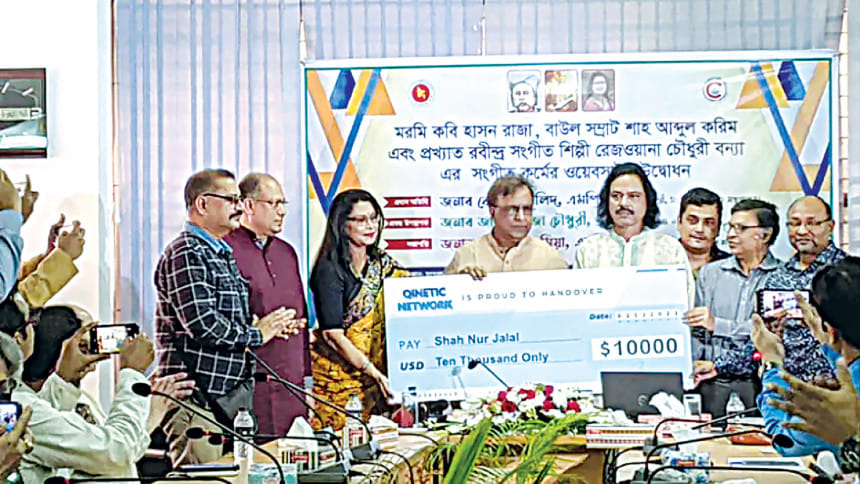
In order to properly protect the rights of musicians in Bangladesh, and ensure that they are compensated for their work, the Copyright Office has taken the necessary steps to ensure the digital form of music is thoroughly safe guarded.
Last year, Baul Shah Abdul Karim's family received USD 10,000 as a one-year royalty payment from the copyright office. The State Minister of Cultural Affairs, K M Khalid, MP handed over the royalty check to the family.
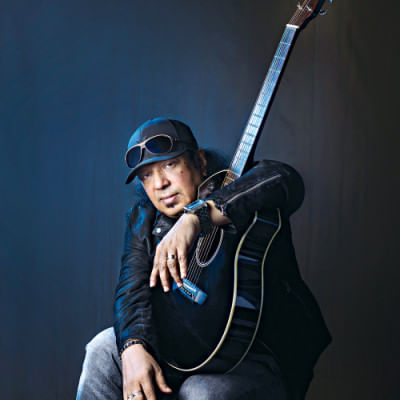
"I did wonder how our children would receive the royalties of the songs. Now, the Copyright Office has made the necessary arrangements. Having received royalties for his music, we settled the payments with the songs' lyricists."
Baul Shah Abdul Karim's son, Nur Jalal regularly receives the royalty payments earned by the late artistes' music. Speaking to The Daily Star, he said, "My father never thought that his songs could make money. If he could see this when he was alive, he would have been very happy. Before the royalty money was disbursed to me, I was struggling a lot. I could not arrange better treatment for my mother, due to a lack of finances. Now the Copyright Office has stored my father's songs in digital format. I hope that his songs reach even more people now. I truly feel blessed to receive payments for my father's music."
Section 78 of Bangladesh's Copyright Act states that a song may not be commercially broadcast (as welcome tunes, on TV, YouTube, etc) without the permission of the lyricist and composer, who owns the rights to a song.
Following Baul Shah Abdul Karim's death, many used his songs commercially without seeking permission from his family. Taking this into consideration, the Bangladesh Copyright Office registered the intellectual property rights of 472 songs by Abdul Karim on December 2021.
Later, the songs were archived on the website shahabdulkarim.com. ZM Studios provided technical assistance in the development of the website, under the supervision of Zafar Raja Chowdhury, former registrar of the Copyright Office, to help preserve Abdul Karim's music.
Apart from Shah Abdul Karim's music, the Copyright Office is working extensively to digitally archive the works of Rabindra Sangeet exponent Rezwana Choudhury Bannya and Hason Raja, by launching their websites.
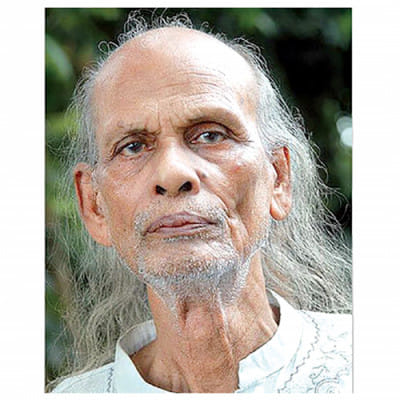
"My father never thought that his songs could make money. If he could see this when he was alive, he would have been very happy. Before the royalty money was disbursed to me, I was really struggling a lot"
Eminent singer Rezwana Choudhury Bannya told The Daily Star, "I am a person who is dedicated to singing. Nowadays, music rights are protected in various ways. The copyright office is making this possible. They have already stored a number of songs by different artistes with the help of technology, which is really a blessing. I hope that many artistes will benefit from it like I have."
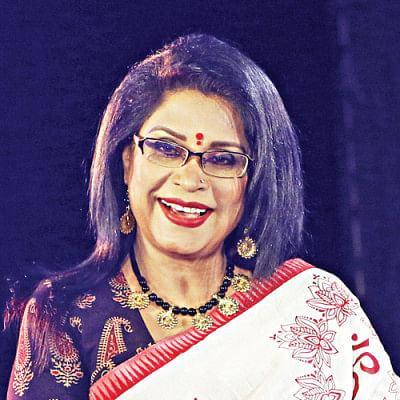
"I am a person who is always dedicated to singing. I hardly understand the technology. Nowadays, music rights are protected in various ways. The copyright office is making this possible" –
Speaking with The Daily Star, Priyanka Devi Paul, Deputy Registrar of the Copyright Office shared, "The copyright office is making significant efforts to ensure the digital survival of the works of iconic musicians. We have already digitally archived some songs of Hason Raja, Shah Abdul Karim, Rezwana Choudhury Bannya, and Ayub Bachchu. These artistes and their families were able to receive some financial support as a result of this. We paid their royalties after using their tunes in digital formats. We have more plans in this regard. The Ministry of Cultural Affairs has made some plans as well. Our next objective is to preserve the songs of Shadhin Bangla Betar Kendra, digitally. We are hoping to make this possible soon. People are really interested in these songs. Aside from that, a new law governing the intellectual property of cinema music is being drafted. All artistes involved in music will easily be able to ensure their rights."
Former Registrar of the Copyright Office, Zafar Raja Chowdhury told The Daily Star, "Artistes are already receiving many benefits from copyrighting their music. We hope that they will receive even more benefits in the future. Because of the option to preserve music digitally, musicians can now earn money online. Artistes are receiving payments in dollars, in the form of remittance. These websites are designed to preserve the intellectual property and financial security of artistes. Due to this initiative, not only singers, but also the country is being benefitted. I hope, in the future, artistes pay closer attention to their rights."
In 2017, rockstar Ayub Bachchu registered the copyright to several of his songs. Later, the legendary guitarist and singer passed away on October 18, 2018. Two years later, on the same day, the Copyright Office took the initiative to digitally preserve 272 songs of this legendary artiste. Last year, his songs earned USD 5,000 (approximately BDT 400,000).
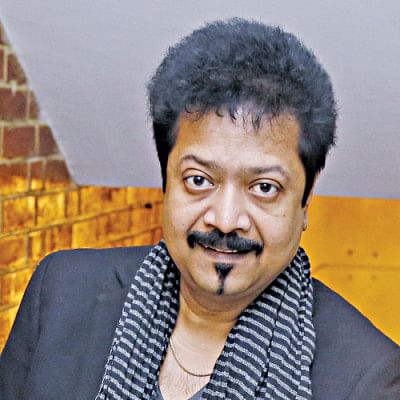
"This initiative by the Copyright Office deserves a lot of praise. They're actively saving the songs of famous musicians from going extinct. This digital archiving is almost like a music library, where anyone can find information about a song. This type of an archive is very good for artistes. The best part is that musicians and their families can receive royalties as a result. I am obviously in favour of archiving music digitally"
Regarding this, Ferdous Akhter Chandana, wife of the late Ayub Bachchu said, "Initially we had no idea about all of this. All we wanted is for the songs to live on in the hearts of fans. We simply wanted his admirers to keep listening to his songs indefinitely. I did wonder how our children would receive the royalties of the songs. Now, the Copyright Office has made the necessary arrangements. Having received royalties for his music, we settled the payments with the songs' lyricists."
Shahid Mahmud Jangi, lyricist, worked with the Ayub Bachchu on a number of his hit tracks. Jangi was full of praise for the Copyright Office.
"The Copyright Office has proved that they can compensate artistes if they want. He had so many successful songs, yet he was still concerned about what would happen when he grew old. While he could not see his music earning royalties in his lifetime, he would have been very happy. The Copyright Office could not ignore Bachchu bhai's massive fanbase. Now, his songs are preserved digitally. This is a great achievement for musicians of the future generation," opined Shahid.
Abdullah al Masud, former guitarist of LRB, shared that he was very happy to see the Copyright Office taking such an initiative. "Those who received money from Ayub Bachchu's songs can give a better opinion than me. It wouldn't have been possible to pay royalties to individuals, if music was not digitally stored. I hope, in the future, we will be able to pay royalties properly. We are grateful to the Copyright Office, because this would not be possible without their support," said Masud.
Legendary singer Kumar Bishwajit shared his opinion on the matter, saying, "This initiative by the Copyright Office deserves a lot of praise. They're actively saving the songs of famous musicians from going extinct. This digital archiving is almost like a music library, where anyone can find information about a song. This type of an archive is very good for artistes. The best part is that musicians and their families can receive royalties as a result. I am obviously in favour of archiving music digitally."
"If the Copyright Office digitally archives the songs of artsites, then it is definitely a good thing. While I don't understand much about the process of copyrighting music, I believe it is a good initiative for musicians like Ayub Bachchu. Since most artistes don't like to go through the hassle of rushing to copyright their music, the Copyright Office should come forward to support artistes in this regard," shared singer Fahmida Nabi.
Stronger copyright laws are the first step torwards protecting the rights and intellectual properties of content makers. When implemented correctly, it can also ensure royalty payment for artistes, be it musicians, writers, painters, etc.
So, in a world that is constantly growing more and more digital, it is important for bodies like the Copyright Office to continue making progress, so that even more people can start seeing the arts as a feasible career path.
Translated by Rakshanda Rahman Misha

 For all latest news, follow The Daily Star's Google News channel.
For all latest news, follow The Daily Star's Google News channel. 



Comments